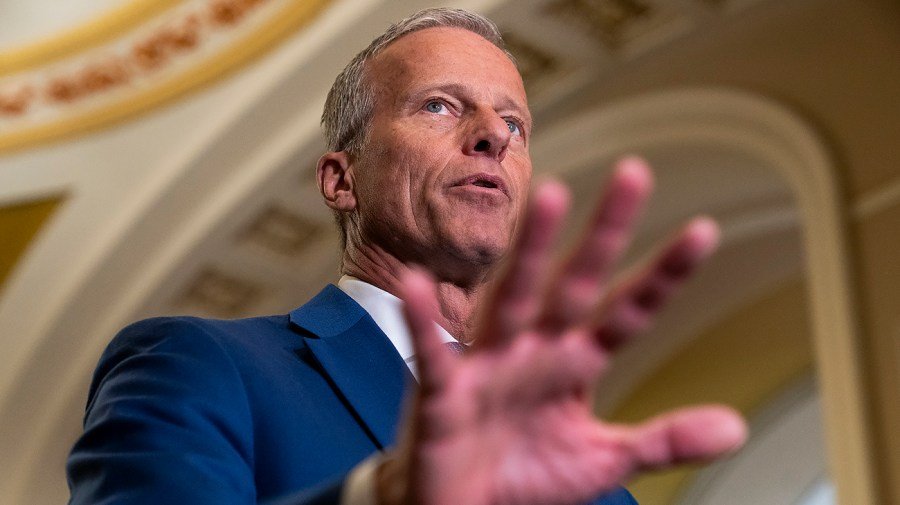
Senate Majority Leader John Thune (R-S.D.) is headed for a showdown this week with a group of Republican senators over a House-passed package that claws back $9.4 trillion in funding from the Corporation for Public Broadcasting and global public health programs.
Members of the powerful Senate Appropriations Committee, including Chair Susan Collins (R-Maine), are not keen on cutting programs they have already funded through bipartisan appropriations bills.
A handful of senior Republican senators are worried about ceding even more power to the Trump administration, as Congress has already done by allowing President Trump to shutter or overhaul agencies such as U.S. Agency for International Development or impose steep tariffs on many of the nation’s trading partners without much pushback.
“I definitely want the PEPFAR cuts and the child and maternal health and other global health cuts removed, but I don’t know how Sen. Thune’s going to structure the process. He’s not shared that with me,” Collins told The Hill, referring to global program that President George W. Bush launched in 2003 to combat AIDS called the President’s Emergency Plan for AIDS Relief.
The Maine senator said she also had strong concerns about proposed cuts to the Corporation for Public Broadcasting.
“As I made very clear at the hearing, there’s a lot of what the Corporation for Broadcasting does that I support such as the 70 percent of the money that goes to local stations, they maintain the emergency alert system, they do local programing such as in Maine there’s a very popular high school quiz show,” she said.
The so-called rescissions package, which the Senate and House must send to Trump’s desk by July 18, would cut $8.3 billion from international aid programs and eliminate fiscal 2026 and fiscal 2027 funding for the Corporation for Public Broadcasting, which supports PBS and NPR affiliates.
Collins, however, expressed more support for cutting funding for NPR, which she says has politically biased reporting. She described NPR as having a “decidedly partisan bent” and highlighted a report written by Uri Berliner, a former senior business editor at NPR, for The Free Press last year.
Sen. Mike Rounds (R-S.D.), another member of the Appropriations Committee, says he’s a “no” on the rescissions package unless GOP leaders find a way to protect tribal radio stations in his home state that would be hit by the cuts to the Corporation for Public Broadcasting.
“At this stage of the game I’ve already told them that I am a no unless we get this resolved one way or another,” Rounds said.
Rounds said he wants to protect “Native American radio stations that [get] caught in the crossfire.”
“Other states have got the same issue, and it’s in these very, very rural areas. It’s about 90 percent of their funding,” he said.
He said he and other GOP colleagues are also concerned about cuts to the Bush-era PEPFAR program.
“It’s one I would like to see resolved. I have not been putting the pressure on it, I think other people have,” he said, referring to the internal GOP debate over reworking the bill.
The last time Trump tried to push a rescissions package through Congress was in 2018. It failed after Republicans senators balked.
That year’s proposal to claw back $15 billion in previously appropriated funding failed in the Republican-controlled Senate by a 48-50 vote. Collins and then-Sen. Richard Burr (N.C.) where the two Republicans who voted no.
Now Thune — who was the Senate GOP conference chair in 2018 — is facing as many as five Republican holdouts on the bill, with a few more GOP colleagues declining to say publicly how they will vote on the controversial package.
Some Republican senators are disgruntled about ceding more authority to the administration after the Department of Government Efficiency shuttered federal agencies, pushed federal workers into early retirement and cut congressionally appropriated funding without getting any input or authority from lawmakers on Capitol Hill.
These GOP lawmakers worry that if they send the pending $9.4 billion rescissions package to Trump’s desk this week, the administration will follow up with additional requests to claw back the money they’ve already approved.
“The bigger question is that I don’t like the rescissions process at all,” a GOP senator who requested anonymity said. “It basically gives the keys to the car to the administration to everything that we’re doing on the appropriations side.
“We’re not getting basic information. We’re being told, ‘This is what we want to do and here’s how much we want for it,’” the senator added. “We’re letting them call everything and then rescissions are coming in on top of all of this?”
The other major concern of Republican appropriators is that passing a partisan rescissions package could derail work on the 12 annual appropriations bills.
They note that Democrats are threatening to block the fiscal 2026 spending bills if the Trump administration and its GOP allies backtrack on funding deals from previous years by clawing back funds.
Senate Democratic Leader Chuck Schumer (N.Y.) warned in a “Dear Colleague” letter last week that “Republicans’ passage of this purely partisan proposal would be an affront to the bipartisan appropriations process.”
Schumer said that “a number of Republicans know it is absurd for them to expect Democrats to act as business as usual and engage in a bipartisan appropriations process to fund the government, while they concurrently plot to pass a purely partisan rescissions bill.”
Republicans hold a 53-to-47 Senate majority and Thune can only afford three defections from his conference and still pass the package of spending cuts, which needs a simple-majority vote.
Sen. Lisa Murkowski (R-Alaska) shares Rounds’s concerns about the impact of eliminating the Corporation for Public Broadcasting and other colleagues’ concerns about cutting global health programs, according to Senate GOP sources familiar with the behind-the-scenes negotiations
“I’m going to be very interested to see what amendments might come forward,” Murkowski told reporters Thursday. “We’re working with others on the public broadcasting [issue].”
Sen. Jerry Moran (R-Kan.), a member of the Appropriations panel, who threatened to vote against the One Big, Beautiful Bill Act because of steep cuts to Medicaid and rural hospitals, hasn’t yet said whether he would vote for the rescissions package.
“I’m going to see what’s there and how the process works,” he said, when asked how he would vote on the bill.
Sen. Shelley Moore Capito (R-W.Va.), another appropriator who balked last month at an immediate phaseout of tax credits for clean hydrogen energy production in the “big, beautiful bill” is also taking a wait-and-see approach on the rescissions package.
“We’re talking about it. I’m very supportive but we’ll see what the details are,” she said.





